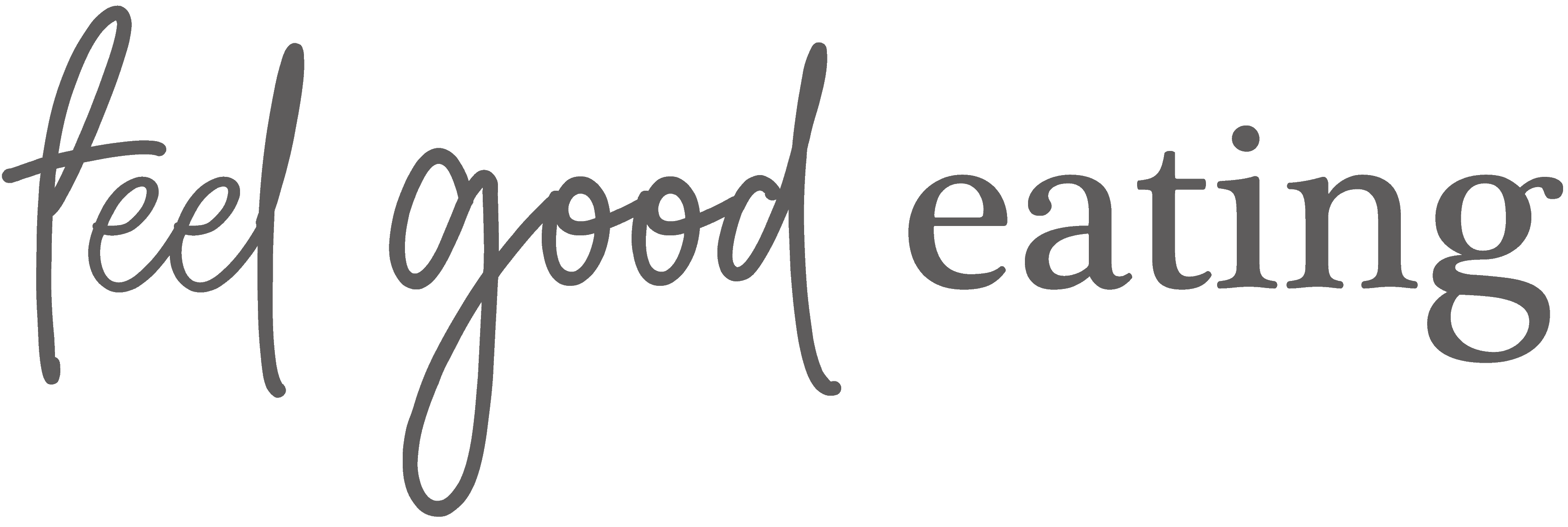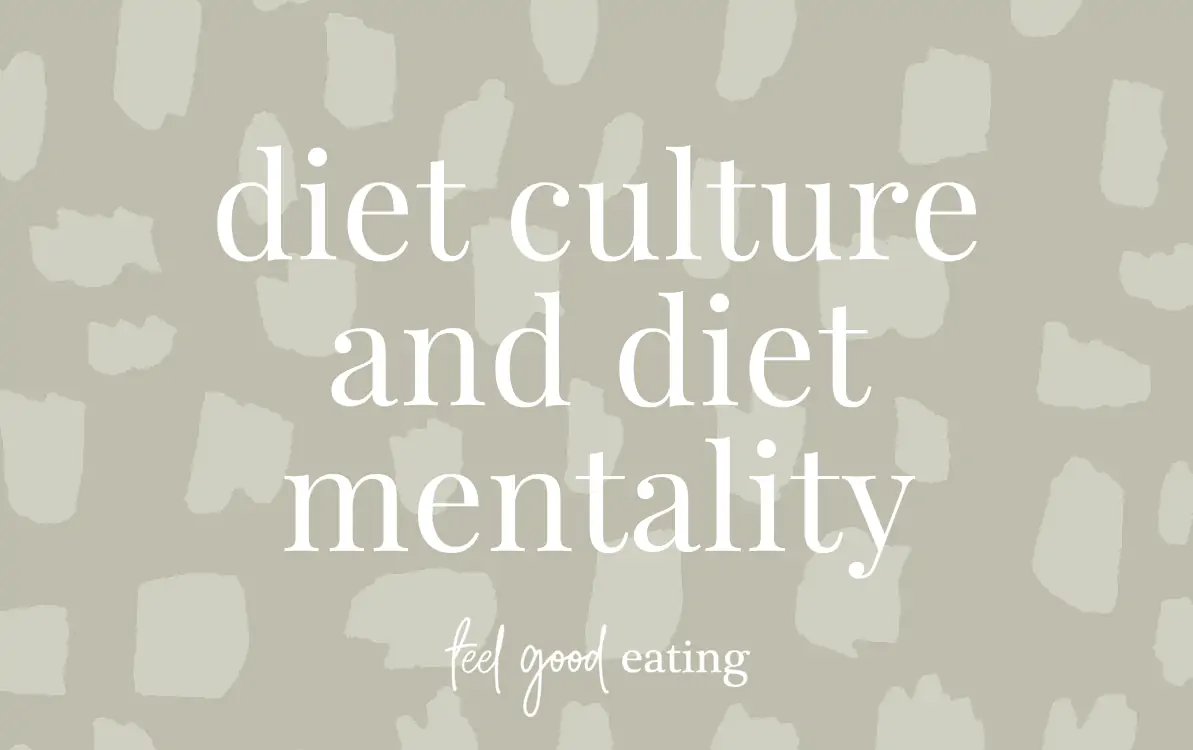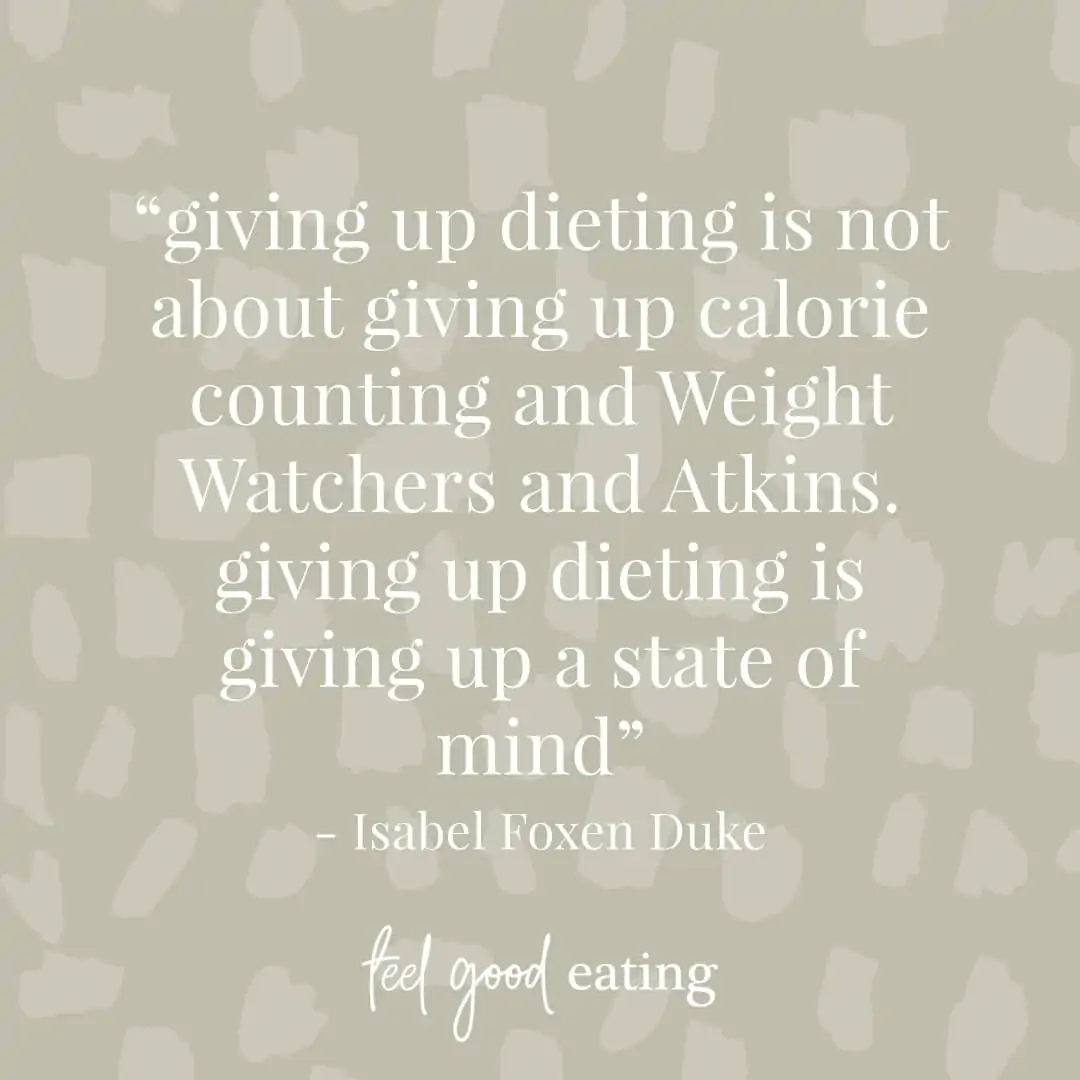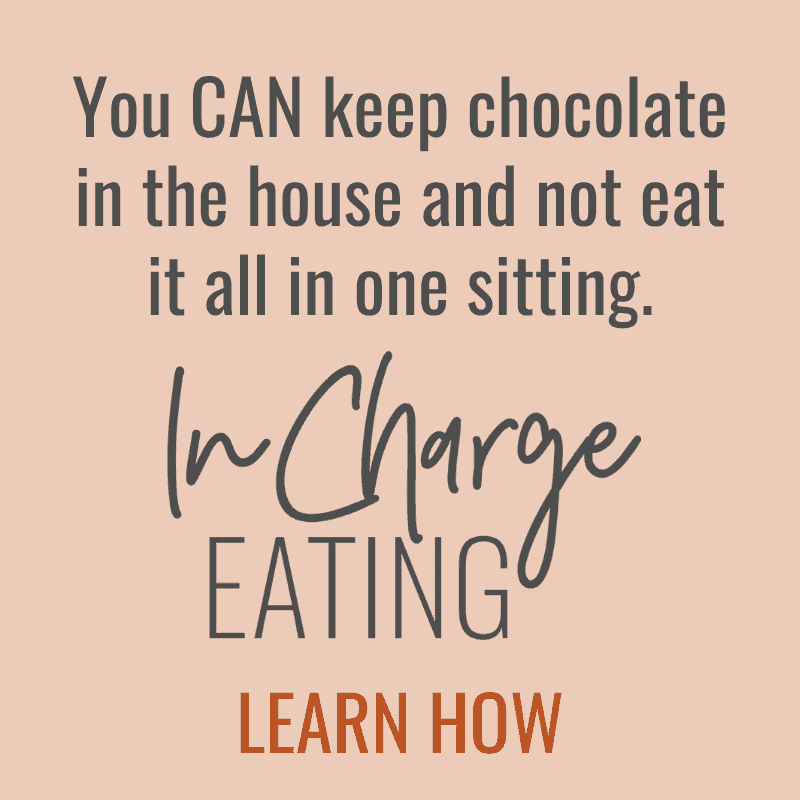I’m no anthropologist, but if there is one thing I know for sure, it is that we are all living within diet culture. It is a type of culture that has crossed geographical boundaries, languages and socio-economic statuses.
Diet culture has gone global*.
But what is it exactly?
Diet Culture
Culture on its own is defined as; “the ideas, customs, and social behaviour of a particular people or society.”
Diet culture then, could be defined as: a system of beliefs, customs, messages and behaviours, that places value and focus on weight, shape and size over and above health and well-being.
Diet culture has hammered into us that our weight and size is the ULTIMATE measure of our worth as a human being.
Diet culture has also conditioned us to believe that weight and size are a direct and unequivocal indicator of our health. And that reaching a state of ‘good health’ is only about our physical health. Diet culture ignores any other factors that go into how a person might perceive and/or value their own, individual health and well-being.
To achieve that status of a worthy, healthy human, diet culture has taught us a very narrow idea of what is considered the ‘correct’ way to eat and demonises foods, cuisines and diet patterns that don’t fit that ideal.
And it continues to exist and remain entrenched because it exploits some of our innermost desires and insecurities. As humans, we all want to be accepted and feel loved – diet culture has become an expert in convincing us that we will be accepted and loved…IF we conform to its rules and expectations.
This means that diet culture has become really hard to see. We just exist in it. The messages, beliefs, dialogue, values and expectations have become our new normal. They have become facts. They have become our ‘truth’.
It is normal for people to comment on weight loss.
It is normal for people to be constantly pursuing weight loss.
It is normal for new mums to have ‘getting their body back’ as the number one thing on their To Do list after giving birth.
It is normal for any medical ailment, injury or pain to be explained away by weight, therefore making weight loss the prescription and cure.
It is normal to have 10 minutes of commentary on the ‘goodness’ or ‘badness’ of the contents of our lunch boxes at work before we can actually start eating.
MORE exercise and LESS food are normal and encouraged, by family, friends, loved ones, even medical professionals – doesn’t matter if you lose your period, hair or sex drive in the process.
It is normal to be constantly dissatisfied and even hate our bodies, and fixate on a time, in the future, where our bodies will be ‘solved’, rather than respect and care for them as they are in the present moment.
In diet culture, it is normal for social media and influencers to have more power to create change than scientific evidence.
It is normal to ignore body diversity.
It is normal to be scared of fatness and believe that being fat is the worst thing in the world.
All of these aspects of diet culture mean that we are at a point in time in human existence that we feel compelled to spend substantial amounts of our time, money and energy (aka our lives) on the pursuit of shrinking our bodies or keeping them from getting bigger. And if for some reason we can’t achieve this ‘thin ideal’, we are left thinking there is something wrong with us, we are weak, broken and unworthy. So, we try that little bit harder. And the cycle continues. This is where diet mentality comes in.
Diet Mentality
Diet mentality is how we individually internalise diet culture. It is how we take all of the messages of diet culture that are around us and apply them to our own bodies and others, to our own thoughts around food/body/weight and to our behaviours.
So we might not necessarily consider ourselves to be on a ‘diet’, but because of the diet culture we live within, we still have thoughts, beliefs and behaviours that have been strongly influenced by diet culture. Things like:
- Having foods that you can’t eat or keep in the house because they will sabotage your weight loss/make you gain weight
- Categorising foods into those that are ‘good’ and those that are ‘bad’ and by extension, internalising the idea that you are ‘good’ or ‘bad’ because you ate a certain food
- Believing that overeating or ‘emotional eating’ is a character flaw that needs fixing
- Feeling that weight loss/health/healing can only be achieved by removing gluten, sugar, dairy and/or grains (or whole food groups) from your diet
- Feeling like the body needs to be cleansed or detoxed “to get back on track”
- Feeling that food cravings need to be curbed/conquered/ignored
- Feeling guilty after eating
- Feeling anxious, overwhelmed or worried about making the ‘right’ decision and not making the ‘wrong’ decision when choosing food
- Believing that the ‘right’ food decisions will occur if you follow external rules of what, when and how much to eat (like meal plans, or elimination diets)
- Telling everyone that you are making ‘lifestyle changes’ to ‘get healthy’, but what this really looks like in your heart-of-hearts is seeing a lower number on the scales
- Doing exercise to burn calories or ‘work off’ something that has been eaten or in anticipation of eating a food or meal
- Counting, measuring or tracking your food and/or exercise
- Exercising even when you feel tired or sore because otherwise, you feel anxious or guilty about not working out
- Ignoring wanting to eat that burger by going for a walk, then eating carrot sticks, then some rice crackers, then a herbal tea and then going and getting that burger, plus chips, plus a thick shake and eating the whole thing so fast you feel sick and get mad for having no will power
- Feeling disappointed, like a failure and weak when the number on the scales don’t budge and even more so if the number increases
- Avoiding social situations or manipulating them because you don’t believe there will be food available that fits your current eating plan
- Avoiding social situations because you don’t trust yourself around the food that will be available
- Finding that you are comparing your body and eating to your friends or strangers and wonder why they can eat whatever they want and have a great body
- Having the number on the scales dictate your mood for the day
- Feeling that your worth as a person in this world is based on your weight and appearance
- Believing you can’t possibly be healthy if your BMI is above 25
- Finding yourself always turning to talk about food and fixing your body when having conversations with others
- Feeling the need to justify your eating
- Pacing your house at 10pm to get your fitness tracker up to 10,000 steps
- Finding yourself eating all the things before you get back on track tomorrow or Monday morning.
- Trying to ‘healthify’ recipes or meals you really want to eat but think you shouldn’t because they are ‘unhealthy’
- Finding yourself passing judgement and criticism on other people’s bodies or what they are or aren’t eating
- Overall, finding that a large proportion of your day is spent thinking about food, eating, exercising and your body – specifically, how you can control all of these things.
If you are reading this (not exhaustive) list right now and it is bringing up some feelings for you, know that none of this is your fault. You weren’t born thinking and acting in these ways. Existing in diet culture means it is inevitable that you will have accumulated these rules, restrictions, beliefs and behaviours along the way.
I would invite you to take the first step to rejecting the diet mentality by acknowledging that diet culture exists and understanding the harm that it is causing to people. None of us are immune.
The more people that can see diet culture for what it is and start actively pushing back against it, the sooner we will shift away from diet culture and towards a new culture that accepts and values ALL bodies.
* Note that this is a bit of a generalised statement. I am aware of some cultures where an obsession with weight does not exist and body diversity is embraced. Maybe we all need to pack up and move there?!



 Hi! My name is Nina.
I’m a Certified Intuitive Eating Counsellor taking the ‘diet’ out of Dietitian. I am here to help you reject diet culture, tune into your body’s own inner wisdom about how to truly nourish yourself and ultimately feel good eating™
Hi! My name is Nina.
I’m a Certified Intuitive Eating Counsellor taking the ‘diet’ out of Dietitian. I am here to help you reject diet culture, tune into your body’s own inner wisdom about how to truly nourish yourself and ultimately feel good eating™ 

Such an important topic in today’s culture indeed. It’s important to enjoy life without feeling guilty for the food choices made!
Exactly!
Love that you defined diet culture and gave so many examples of the food rules it creates. Too often I think the term is used without thinking about other’s perception of it!
I had to stop listing them – it was getting a bit ridiculous. But I guess that is diet culture and the diet mentality for you!
Amen Kelly!! You are amazing and a courageous dietitian that encourages women to listen to their bodies and ditch this diet mentality that seems to weave its ugly webs into our minds. Thanks for what you do!
This is truly the undercurrent of many daily choices we subconsciously make. Thank you for an excellent article – recognizing diet culture is the first step to rising above it and embracing that healthy bodies come in diverse range of sizes.
Thanks so much Sarah for reading and your lovely feedback.
Thank you – a valuable shareable! <3
Thanks so much Vania – that means a lot coming from you. I love your writing.
Brought tears to my eyes reading this list. I work in an office surrounded by women who LIVE and preach diet culture. I have stopped eating my lunch in the staff room for fear my lunch will be judged. I hate this but can’t escape it.
Oh Jackie, I am so sorry you are being impacted by diet culture in this way. I can totally appreciate why you would want to remove yourself from that toxicity. Sending you strength.
Yes yes yes!! As a nutritionist, who preaches body acceptance and diet culture problems on my instagram this is SO important to speak about!!